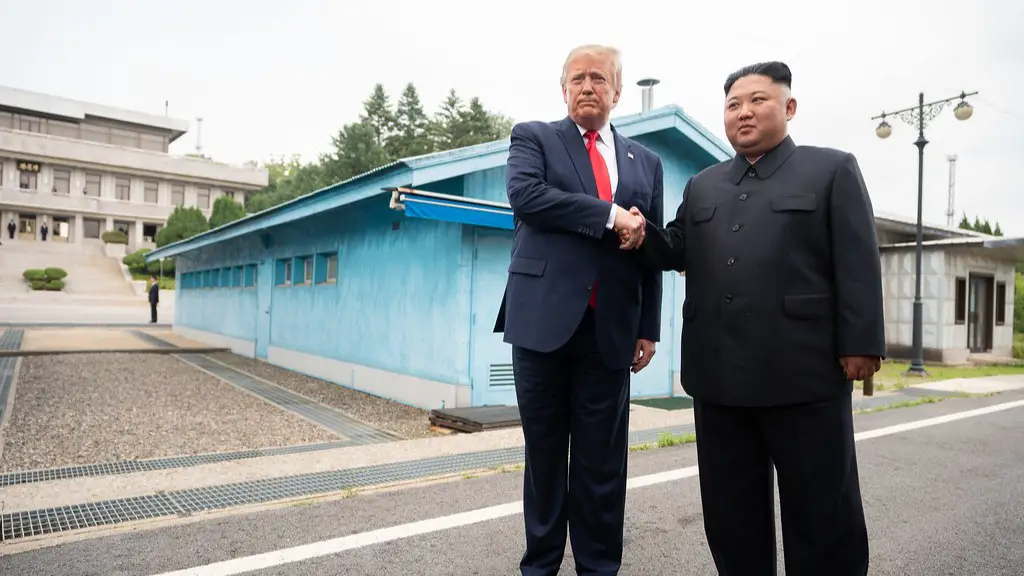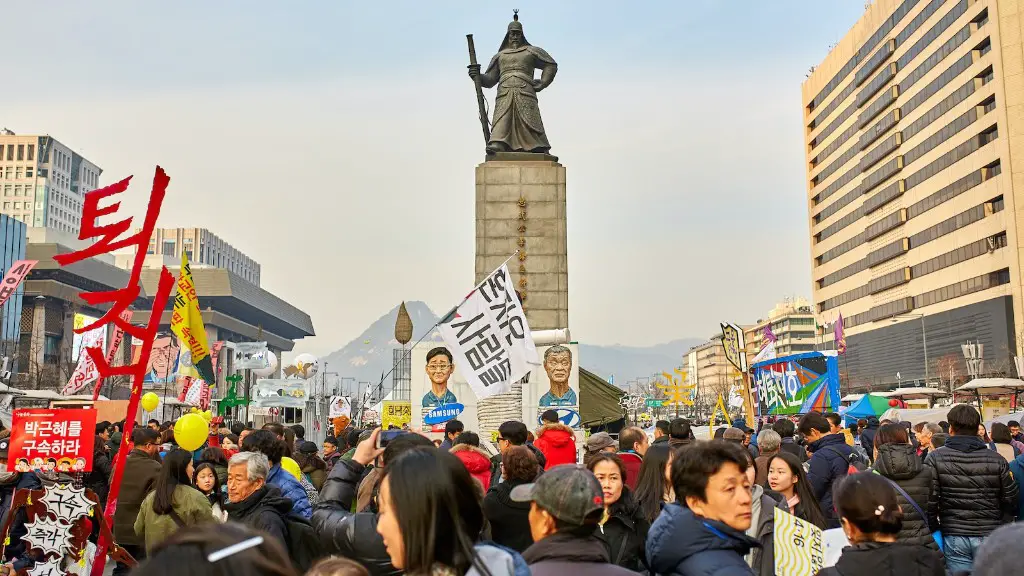It has been a decades-long question whether South Korea could successfully beat North Korea in a war. North Korea possesses both an enviable conventional military force and nuclear weapons, which make it a formidable opponent. Meanwhile, South Korea has significant advantages over its northern neighbor such as higher GDP, larger budget for military defense and an ally of the United States. In spite of these advantages, is it possible for South Korea to outmatch North Korea in a war?
Experts suggest that the South Korean military has the potential to trounce its northern adversary. South Korea’s qualitative superiority in its armed forces gives it an edge over North Korea. South Korea’s air forces are considered to be better equipped and technologically-advanced than North Korea’s air forces. Meanwhile, South Korea is more experienced in waging strategic warfare and its armed forces have been more actively trained than North Korea’s. Furthermore, South Korea has greater financial resources and manpower compared to North Korea.
Nevertheless, North Korea’s potential to cause destruction is concerning. North Korea’s nuclear weapons are considered to be highly destructive, and the country is believed to possess over 6,000 ballistic missiles, many of which are capable of reaching South Korea within minutes. North Koreans have also been known to employ a “scorched earth” policy that would set their own territory ablaze in order to retaliate against South Korea.
However, despite the immense destruction that North Korea could cause, the overall war cost of the confrontation between the two Koreas remains in the favor of South Korea. Analysts suggest that the economic cost of armoring North Korea for a war could be as much as 68 trillion Won; a figure that could bankrupt the nation in a matter of months. On the other hand, South Korea’s economy could remain robust even in the event of a protracted war, since it has a much larger revenue base to draw from.
Apart from the financial and military factors, the geopolitics of the situation will also play an important role in determining the result of a war between North Korea and South Korea. South Korea is backed by the United States, Japan and other world powers such as the United Nations, meaning that a war with North Korea would likely lead to severe international censure and economic sanctions. North Korea is isolated and has few allies, and as a result it may not be able to withstand mounting pressure from the international community.
Although South Korea has the upper hand in terms of resources and military might, North Korea’s unconventional warfare may be able to create destruction and and inflict casualties on the South. This creates an unpredictable situation that may be impossible to predict accurately. Furthermore, if war does exist between the two nations, the repercussions can be felt in the entire region, threatening stability and peace in the Far East.
North Korea’s Nuclear Capabilities
North Korea has become notorious for its nuclear weapons programs and the potential damage they may cause. North Korea has issued a number of threats regarding their nuclear capabilities in recent years, which has raised alarm from governments and security organizations around the world. In 2017, the United Nations concluded that North Korea had developed the capacity to create nuclear weapons of an intercontinental range in violation of international law. Although North Korea may not have the primary target of engaging in a nuclear war with South Korea, its nuclear weapons programs may still increase the chance for war if provoked.
Experts suggest that North Korea is unlikely to completely abandon its nuclear capabilities, since their nuclear arsenal has become a key source of leverage and prestige for the leadership. The fear of retaliation from nuclear weapons in the event of an attack may also play a role in North Korea’s decision-making, and could help prevent a major conflict. However, this could lead to a situation of mutually-assured destruction, which is not desirable for either side.
Despite North Korea’s capabilities, South Korea has several options to reduce the potential damage of its nuclear weapons. South Korea has developed a missile defense system that is designed to intercept and destroy any incoming missiles from North Korea. The system is designed to be a deterrent, making North Korea think twice before launching any nuclear weapons. In addition, South Korea has a number of evacuation plans in place to minimize casualties in the event of a nuclear attack.
The prospect of nuclear war between the two nations is a stark reminder of the tensions that exist in the Korean peninsula. It is important for all parties involved to work towards peaceful resolution of the conflict in order to prevent such a conflict from occurring.
South Korea’s Military Preparedness
South Korea has made great efforts to prepare for any potential conflict with North Korea by both upgrading its military technology and improving its operational capabilities. They are updating their air force capabilities and increasing the number of fighter jets and modern weaponry. In addition, they have been building up their ground forces, artillery, and special forces capabilities in order to respond to any potential ground attack. South Korea has also increased their training exercises, which has given their ground forces a chance to practice and improve their strategies in a simulated environment.
In addition, South Korea is taking steps to improve its defense against North Korea’s unconventional weapons, such as cyberwarfare. South Korean companies and institutions have been working to bolster their cybersecurity capabilities in order to ward off any potential attacks from North Korea. South Korea is also attempting to build up its intelligence capabilities in order to identify any potential threats and to be able to respond quickly and effectively.
South Korea has also enlisted the aid of the United States and other allies to help protect against North Korea. The United States currently has a 30,000-strong military presence in South Korea, making it the largest in East Asia. This presence serves as a deterrent against North Korea and it can also be used to aggressively respond to any potential attack.
Overall, South Korea has taken major steps towards preparing for potential conflict with North Korea. Its military is considered to be one of the best equipped in the region and its involvement of allies and partnerships further strengthens its capability.
The Role of the United States
The United States is an important player in the situation surrounding the Korean peninsula. As a long-term defender of South Korea, the US has shifted its policy towards North Korea in recent years with an aim to achieve peace and denuclearization through negotiations. Although the United States government has not officially committed to any military assistance for South Korea, it has made clear that it is willing to act if necessary to prevent North Korea from threatening the security of South Korea.
The United States has also imposed a series of economic sanctions designed to pressure North Korea into denuclearization and peace talks. These sanctions are targeted at North Korea’s leadership, financial elite, and military-industrial complex. However, it is uncertain whether these sanctions are enough to compel North Korea to abandon its nuclear weapons and participating in negotiations.
The United States has also developed a network of regional alliances with South Korea and other regional powers such as Japan and China. This network of allies is designed to form a strong bulwark against North Korea and act as a brake against any aggressive actions by North Korea. The presence of the United States is also seen as a sign of commitment and determination to prevent any military conflict from occurring in the region.
Ultimately, the United States can greatly influence the situation between the two Koreas, and its position and policies could play a pivotal role in determining the eventual outcome of any potential conflict.
Analyzing the Risks of War
When analyzing a potential war between North Korea and South Korea, it is important to take into account the risks and consequences. A war between the two nations would be devastating for the entire Korean peninsula and could have serious global implications as well. The military capabilities of the two Koreas, coupled with the potential for nuclear warfare and the involvement of foreign powers, would make the conflict particularly dangerous and unpredictable.
In addition, a war would be detrimental to the economy and society of both nations. Millions of lives would be at risk, and there would likely be massive disruption to the economic and energy sectors of both Koreas and their respective allies. This is not only a humanitarian issue, but could also lead to a severe economic recession in East Asia and even beyond.
The volatility of the situation between North Korea and South Korea also makes the risk of war particularly high. Any major escalation or miscalculations, such as an unplanned exchange of gunfire, could easily lead to a major armed conflict. As such, it is essential that both North Korea and South Korea take steps to avoid any military confrontation and take advantage of the current ceasefire agreement.
The Benefits of a Peaceful Resolution
Despite the potential risks of war, there is also the possibility for a peaceful resolution between North Korea and South Korea. Recent progress on the diplomatic front has provided some hope that the two nations may be able to eventually reach an agreement. Although South Korea and North Korea have long been hostile towards each other, it is possible for the two nations to reach an understanding and eventually establish peaceful relations.
If a peaceful resolution is reached, there is potential for economic prosperity for both Koreas. Countries around the world have expressed their willingness to increase investment in infrastructure projects in the region, which could help benefit the economies of both nations. In addition, the reduction of military tensions and the end of sanctions could provide much-needed relief to the sanctions-worn North Korean citizens.
A peaceful resolution would also create a more secure environment in East Asia and create the potential for political stability in the region. This could open up opportunities for regional cooperation and the prospect of establishing closer ties between South Korea, North Korea and their respective allies.
Ultimately, a peaceful resolution between the two Koreas would benefit everyone involved. However, it is important to remain realistic and acknowledge the potential risks of war in the region. It is therefore essential for all parties involved to work towards a peaceful resolution that is beneficial to all.





